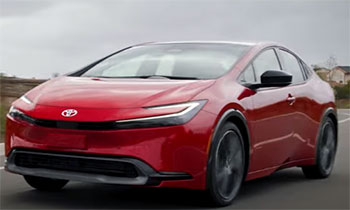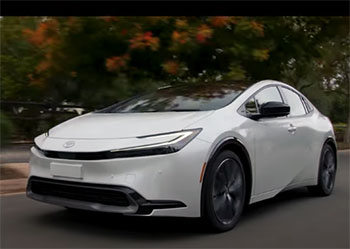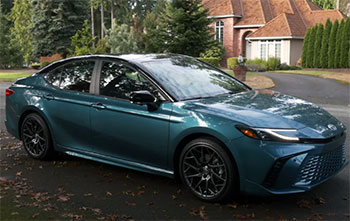As a car enthusiast who’s spent countless hours behind the wheel, I’ve always been drawn to Toyota’s hybrid lineup for its blend of efficiency and reliability. In this article, I’ll share my firsthand experience comparing the 2025 Toyota Prius and Toyota Camry Hybrid, two vehicles that redefine what hybrids can do.
My goal is to help you decide which one fits your lifestyle by breaking down their pros, cons, and key features in a way that’s engaging and easy to understand. From fuel economy to comfort, I’ll explore what makes each car shine and where they fall short.
Comparison Table: Toyota Prius Vs. Toyota Camry Hybrid
| Feature | Toyota Prius (LE Trim) | Toyota Camry Hybrid (LE Trim) |
|---|---|---|
| Starting MSRP | $27,950 | $28,855 |
| Fuel Economy (City/Hwy/Combined) | 57/56/57 MPG | 53/50/51 MPG |
| Horsepower | 194 hp (FWD) | 225 hp (FWD), 232 hp (AWD) |
| Cargo Space | 23.8 cu ft (hatchback) | 15.1 cu ft (trunk) |
| Passenger Space | 91.2 cu ft | 99.9 cu ft |
| Engine | 2.0L 4-cylinder hybrid | 2.5L 4-cylinder hybrid |
| Transmission | Electronically controlled CVT | Electronically controlled CVT |
| Drive Options | FWD, AWD | FWD, AWD |
| Infotainment | 8-inch touchscreen, optional 12.3-inch | 8-inch touchscreen, optional 12.3-inch |
| Safety Features | Toyota Safety Sense 3.0 | Toyota Safety Sense 3.0 |
| Interior Materials | Fabric, optional SofTex | Fabric, optional leather |
| Curb Weight | 3,097 lbs (FWD) | 3,450 lbs (FWD) |
My Experience With the Toyota Prius

I’ve always been curious about the Prius, a car that’s practically synonymous with hybrid technology.
When I first slid into the driver’s seat of the 2025 Toyota Prius LE, I was struck by how far it’s come from its early, boxy days.
The redesigned Prius feels like a bold statement, with sleek lines and a futuristic vibe that made me do a double-take in the parking lot. It’s no longer just the eco-warrior’s choice; it’s a car that wants to be noticed.
Driving the Prius around my city, I felt like I was piloting a spaceship on a budget.
The 2.0-liter four-cylinder hybrid engine, paired with an electric motor, delivers 194 horsepower in front-wheel drive (FWD) models.
It’s peppy enough for city streets, zipping through traffic with a quiet hum that’s oddly satisfying. The continuously variable transmission (CVT) keeps things smooth, though it can feel a bit droney under hard acceleration. I averaged about 55 MPG in mixed driving, which felt like a small victory every time I passed a gas station.
The interior surprised me with its modern touches. The 8-inch touchscreen (upgradable to 12.3 inches) was intuitive, and wireless Apple CarPlay made syncing my phone a breeze. The hatchback design was a game-changer for practicality—I tossed in groceries, a bike, and even some camping gear without breaking a sweat.
But the rear seating? That’s where I started to notice compromises. My taller friends complained about the snug legroom, and the low roofline made getting in and out a bit awkward. Still, for solo commutes or small families, the Prius felt like a practical, efficient companion.
On the highway, the Prius held its own, though it’s not built for thrill-seekers. The suspension is tuned for comfort, soaking up bumps well, but the steering felt a tad light for my taste. Toyota Safety Sense 3.0, standard across all trims, gave me peace of mind with features like adaptive cruise control and lane-keeping assist. Overall, the Prius felt like a car designed for someone who prioritizes efficiency and versatility but doesn’t mind sacrificing a bit of luxury.
Read More: My Thoughts On GMC Terrain Vs. Ford Escape
Pros Of the Toyota Prius
- Unmatched Fuel Economy: The Prius LE achieves an EPA-estimated 57 MPG combined, making it one of the most efficient hybrids on the market. During my week-long test, I consistently hit close to 56 MPG in mixed driving, saving me significant cash at the pump compared to traditional gas vehicles. For commuters or those with long daily drives, this efficiency is a game-changer, especially with fluctuating fuel prices.
- Versatile Cargo Space: The hatchback design offers 23.8 cubic feet of cargo space, which I found incredibly practical. I easily fit a week’s worth of groceries, a stroller, and a couple of duffel bags for a weekend trip. The fold-down rear seats expand the space further, making it ideal for small families or anyone needing to haul gear without upgrading to an SUV.
- Sleek, Modern Design: Gone are the days of the Prius looking like a science project. The 2025 model’s aerodynamic shape and sharp headlights give it a sporty, futuristic edge. I got compliments from friends who couldn’t believe it was a Prius, which speaks to Toyota’s success in reimagining its iconic hybrid.
- Affordable Starting Price: At $27,950 for the LE trim, the Prius is slightly cheaper than the Camry Hybrid. For budget-conscious buyers who want hybrid efficiency without breaking the bank, this price point is a major draw. It’s a compelling option for first-time hybrid buyers or those downsizing from larger vehicles.
- Eco-Conscious Appeal: Driving the Prius made me feel like I was doing my part for the environment. Its low drag coefficient and 40% thermal efficiency mean it sips fuel and reduces emissions. For someone who values sustainability, the Prius is a badge of pride.
- Advanced Safety Features: Toyota Safety Sense 3.0 includes pedestrian detection, adaptive cruise control, and lane-keeping assist. I found the system intuitive, especially during rush-hour traffic, where it gently nudged me back into my lane without being intrusive.
Cons Of the Toyota Prius

- Cramped Rear Seating: The Prius’s compact size and low roofline make the back seat feel tight for taller passengers. When I had friends over 6 feet tall ride along, they struggled with legroom and had to duck to get in. This makes it less ideal for families or frequent carpoolers compared to larger sedans.
- Limited Luxury Options: While the interior is functional, it lacks the premium feel of higher-end hybrids. The base LE trim comes with fabric seats, and even the SofTex material on higher trims feels a step below leather. If you’re after a more upscale cabin, the Prius might disappoint.
- Light Steering Feedback: The steering feels a bit disconnected, especially at higher speeds. During my highway drives, I wished for more precision and heft, which made the Prius feel less engaging than sportier hybrids. It’s fine for commuting but not for carving corners.
- Smaller Fuel Tank: The 11.3-gallon fuel tank, while efficient, limits the Prius’s range compared to larger vehicles. I calculated a range of about 644 miles, which is great but slightly less than the Camry Hybrid’s 663 miles. For long road trips, you’ll stop for gas a bit sooner.
- Noise Under Acceleration: The CVT and engine can get vocal when you push the Prius hard. I noticed a noticeable hum during quick merges onto the highway, which detracted from the otherwise quiet ride. It’s not a dealbreaker, but it’s less refined than I expected.
- Less Power Than Competitors: With 194 horsepower, the Prius is adequate but not thrilling. Compared to the Camry Hybrid’s 225 horsepower, it feels underpowered, especially when fully loaded or climbing steep hills. If you prioritize performance, you might find it lacking.
My Experience With the Toyota Camry Hybrid

When I hopped into the 2025 Toyota Camry Hybrid LE, I immediately felt like I was in a more substantial car.
The Camry’s midsize sedan frame exudes a sense of solidity, and its redesigned exterior, with sleek headlights and a bold grille, gave it a premium look that rivals some luxury brands.
It’s the kind of car that feels at home on long highway cruises or navigating busy city streets.
The Camry Hybrid’s 2.5-liter four-cylinder engine, paired with electric motors, pumps out 225 horsepower in FWD models (232 with AWD), making it noticeably punchier than the Prius.
I felt confident merging onto freeways, and the CVT, while not as engaging as a traditional automatic, delivered smooth power. My fuel economy averaged around 47 MPG, impressive for a car of its size but not quite matching the Prius’s thriftiness.
Inside, the Camry felt like a step up in refinement. The cabin is spacious, with generous legroom for rear passengers—my family didn’t complain once during a weekend road trip. The 8-inch touchscreen (with an optional 12.3-inch upgrade) was responsive, and the standard dual-zone climate control kept everyone comfortable. The trunk, at 15.1 cubic feet, handled luggage well, though it’s less versatile than the Prius’s hatchback.
On the road, the Camry Hybrid impressed me with its composed ride. The suspension soaked up potholes better than the Prius, and the steering, while not sporty, felt more connected. Toyota Safety Sense 3.0 worked flawlessly, with features like automatic high-beams and blind-spot monitoring boosting my confidence. The Camry Hybrid felt like the more polished, all-around choice for someone who values comfort and power alongside efficiency.
Pros Of the Toyota Camry Hybrid
- Spacious and Comfortable Cabin: The Camry’s 99.9 cubic feet of passenger space makes it a haven for families or those with frequent passengers. I comfortably fit four adults on a road trip, with no complaints about legroom or headroom. The seats, especially in higher trims with leather, felt plush and supportive for long drives.
- More Powerful Performance: With 225 horsepower (232 in AWD models), the Camry Hybrid feels lively and responsive. I appreciated the extra grunt when passing slower traffic or climbing hills, making it a better fit for drivers who want a bit of pep without sacrificing efficiency.
- Refined Ride Quality: The Camry’s suspension is tuned for comfort, smoothing out rough roads better than the Prius. During my test, I barely felt the bumps on my city’s poorly maintained streets, and highway cruising was serene, with minimal road noise.
- Premium Interior Options: Higher trims like the XLE and XSE offer leather upholstery, a heated steering wheel, and ambient lighting, giving the Camry a near-luxury feel. I found the cabin’s design and materials more upscale than the Prius, especially with the optional 12.3-inch displays.
- Advanced Technology: The standard 8-inch touchscreen, wireless Apple CarPlay, and Android Auto worked seamlessly in my tests. The optional JBL audio system was a treat for music lovers, and the available head-up display kept my eyes on the road. It’s a tech-savvy choice for modern drivers.
- Strong Safety Ratings: Like the Prius, the Camry Hybrid comes with Toyota Safety Sense 3.0. I particularly liked the adaptive cruise control’s smooth operation on highways, and the IIHS Top Safety Pick+ rating (for similar models) added confidence in its crash protection.
Cons Of the Toyota Camry Hybrid
- Lower Fuel Economy Than Prius: At 51 MPG combined, the Camry Hybrid is efficient but trails the Prius’s 57 MPG. I noticed the difference at the pump during my week-long test, especially in city driving where the Prius’s lighter weight and smaller engine shine.
- Less Cargo Versatility: The Camry’s 15.1-cubic-foot trunk is decent for a sedan but can’t match the Prius’s hatchback flexibility. I struggled to fit bulkier items like a stroller without folding the seats, which required more effort than the Prius’s open cargo area.
- Higher Starting Price: Starting at $28,855, the Camry Hybrid is slightly pricier than the Prius. For budget-conscious buyers, that $900 difference could be a factor, especially if fuel savings are a top priority over comfort or power.
- Less Distinctive Styling: While the Camry’s design is sleek, it doesn’t stand out as much as the Prius’s bold, futuristic look. I found it blends into the sea of sedans on the road, which might disappoint those seeking a unique aesthetic.
- Heavier Curb Weight: At 3,450 pounds (FWD), the Camry is heavier than the Prius’s 3,097 pounds. This impacts agility, and I noticed it felt less nimble in tight parking lots or sharp turns compared to the lighter Prius.
- Limited Electric-Only Range: Unlike the Prius Prime’s 44-mile electric range, the Camry Hybrid relies more on its gas engine. I missed the ability to drive short distances on pure electric power, which could save even more fuel for city commuters.
Read More: My Thoughts On Acura MDX Vs. Volvo XC90
Frequently Asked Questions (FAQ)
The Prius has a cramped rear seat, limited luxury options, light steering feedback, a smaller fuel tank, noticeable engine noise under acceleration, and less power compared to the Camry Hybrid.
Both the Prius and Camry Hybrid have excellent reliability, with iSeeCars ratings of 8.9/10. The Prius edges out slightly due to its simpler design and longer hybrid track record.
The Toyota Prius has not been discontinued; it’s still in production for 2025. However, its role has shifted as Toyota hybridizes more models, reducing its exclusivity as a hybrid option.
With proper maintenance, a Prius hybrid can last 200,000–300,000 miles or more. I’ve heard of owners reaching 500,000 miles with minimal issues, thanks to Toyota’s durable hybrid system.
Conclusion: For the Toyota Prius and Camry Hybrid
You’re probably wondering which hybrid is right for you, and I get it—it’s a tough choice. After spending time with both the 2025 Toyota Prius and Camry Hybrid, I can say they’re both stellar in their own ways. If you’re all about maximizing fuel economy, love a hatchback’s versatility, and want a car that screams “eco-conscious,” the Prius is your match. Its 57 MPG and $27,950 starting price make it a no-brainer for budget-minded commuters or small families who don’t need tons of rear legroom. But if you crave a more spacious, refined ride with extra power and a touch of luxury, the Camry Hybrid is the way to go. Its 51 MPG, roomy cabin, and 225 horsepower make it ideal for long drives or growing families, even if it costs a bit more at $28,855.
For me, the Prius won my heart for city driving and its quirky charm, but the Camry’s comfort stole the show on highways. Your lifestyle—whether it’s urban commutes or cross-country trips—will tip the scales. Test-drive both and see which one feels like home. Whichever you choose, Toyota’s hybrid legacy ensures you’re getting a reliable, efficient ride that’s ready for the long haul.

